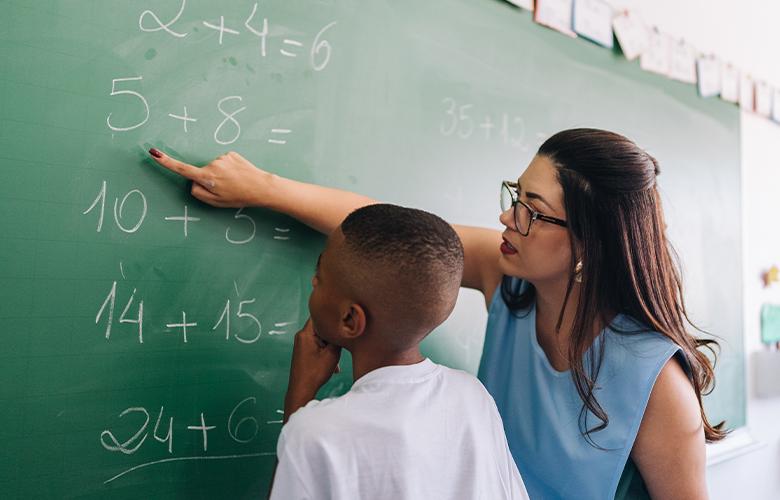
Throughout the United States, there is a growing dearth of math and science teachers, particularly in under-resourced schools. Our Preparation for Persistence (P4P) project, funded by NSF’s Robert Noyce Teacher Scholarship Program, seeks to understand this challenge by partnering with teacher preparation programs that aim to improve the quality and longevity of STEM teachers in under-resourced schools.
The majority of the teacher workforce today is White, and many come from socioeconomic, racial, and/or cultural backgrounds that differ from the communities where they end up teaching, presenting challenges for both the teachers and their students, especially when teachers are beginning their careers in under-resourced schools. A key part of many teacher preparation programs is to attune these teachers to the culture and history of minoritized communities through courses that focus on topics such as culturally responsive pedagogy or sociohistorical education. While important, this focus restricts pre-service teachers to their college and university classrooms without giving them the opportunity to meet and build relationships with the people who live in these communities.
Through our research with Noyce-funded teacher preparation programs across the country, we’ve documented strategies that Noyce programs use that get pre-service teachers out of the classrooms and into the communities. Immersive activities in under-resourced communities enable pre-service teachers to connect with the community and build relationships with its members. Such strategies position teachers to begin their first year of teaching having a better understanding of the schools and communities they’ll be a part of and the knowledge and skills necessary to teach with cultural responsiveness.
The following are three strategies our Noyce program partners used to build cultural awareness and competence:
- Meet and co-plan educational activities with community members. One Noyce-funded teacher preparation program facilitated meetings between pre-service teachers and stakeholders from local under-resourced communities, such as parents, the mayor, and local business owners. During these meetings, pre-service teachers learned directly from community members about the neighborhoods where their future students live. Drawing upon these conversations, pre-service teachers were then able to apply their new knowledge to a collaboration with local community organizations in which they co-designed a summer camp. This collaboration enabled pre-service to practice structuring activities in culturally responsive ways that mirrored the culture, history, languages, and genders of the local student population.
- Arrange homestays with local families. Another program arranged for pre-service teachers to live in the under-resourced community in which they would later teach as part of their practicum experience. While residing with families, they had the opportunity to not only learn about the community but to also build relationships with parents. They listened to parents’ perspectives of their children’s educational needs and what they thought was working well or not working well in their children’s school.
- Take neighborhood walks. One program required pre-service teachers to spend time walking around and exploring the community. In this structured activity, they observed and noted neighborhood features, such as the interactions between people, building designs and density, street landscape, types of businesses, spoken languages, types of music, and police presence. They were then asked to reflect upon their own reactions to the neighborhood, such as their comfort level, their ability to engage with community members, and the ways in which their observations were consistent with or different from their pre-conceived notions about the neighborhood. Lastly, pre-service teachers were asked to draw upon their experiences to consider how they could construct a curriculum that would be culturally responsive to the children living in that neighborhood.
Through these three Noyce strategies, these pre-service teachers were able to reflect upon and apply the educational theory they learned in their preparation programs to the under-resourced schools and communities they will be teaching in. This combination of knowledge and experience, in addition to the relationships they were able to build, will better position them to thrive as culturally responsive teachers.
Read more about the P4P project’s virtual collaboration here.
Lukas Winfield, Research Associate, is an experienced mixed-methods researcher and evaluator of STEM education. His research focuses on how education materials reinforce science-related stereotypes and function as barriers to underrepresented groups. |

Add new comment